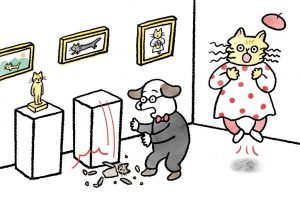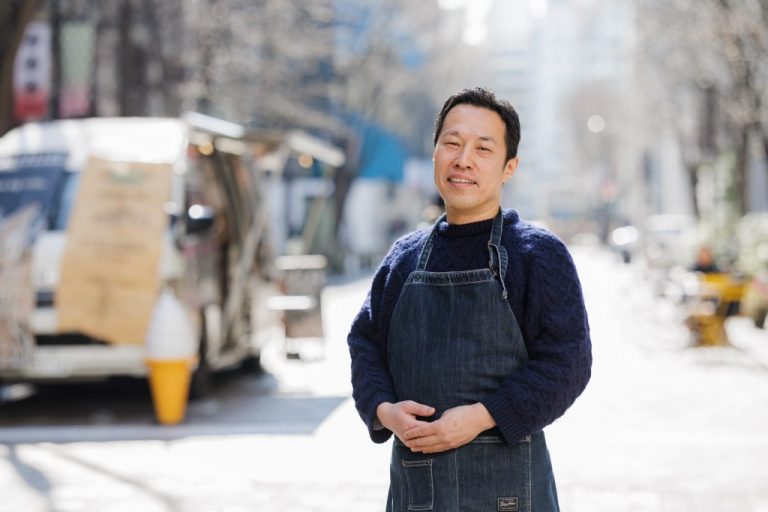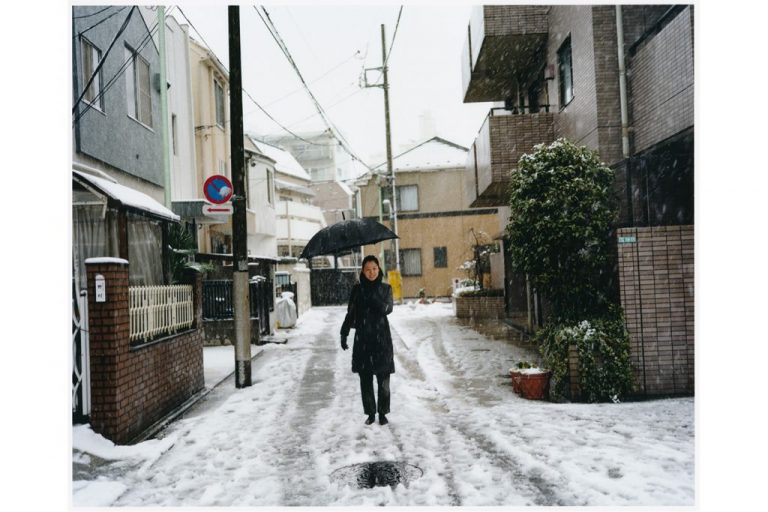Left: Consulter Tamako
Center, Right: Lawyers Maruyama, Kakuta
What if your artwork is damaged at your solo exhibition venue? (Part 2)
Art Emergency Hotline!
No.003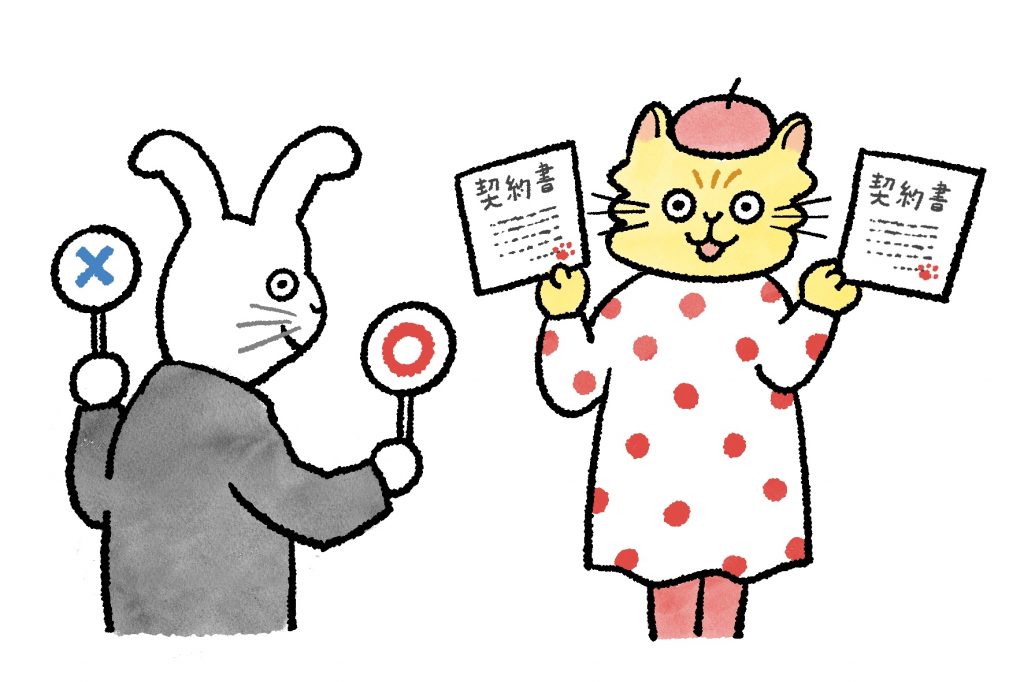
Art Emergency Hotline provides urgent assistance for distressed artists. Several legal professionals answer to a range of consulters each time. The law does not restrict your creative activities, and having the right knowledge can provide vital support.
This time, the consultation is “If a work of art is broken at a solo exhibition venue.” If an audience damages a work of art, how should compensation be considered?
The second part will delve into what kind of commitments can be made in advance with the gallery that will be the venue.
Illustration: Kaeko Akaike
Cooperation and supervision: Arts and Law
Editor: Yoichiro Takemi
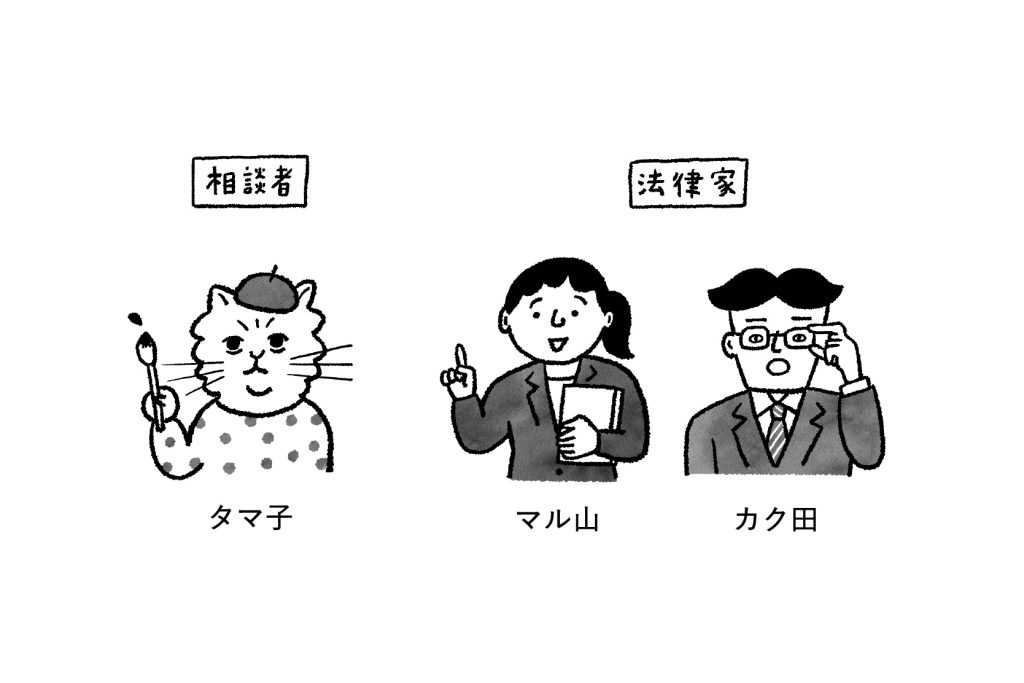
 Maruyama
Maruyama
I think it’s primarily the responsibility of the gallery or museum to manage the system. However, there may be exceptions, especially when the audience is expected to interact with the artwork, such as in the case of crafts like teacups and clothing. This falls under the concept of “duty of care.”
 Kakuta
Kakuta
Yes, it is. It’s about fulfilling the duty of care towards the venue.
Duty of care… what does that mean?
 Tamako
Tamako
 Maruyama
Maruyama
It refers to “the obligation to act responsibly, akin to being a competent manager.” In simpler terms, it’s your job, so please do it properly.
Legal term for this installment
Duty of care
“Duty of care of a good manager,” meaning to exercise the degree of care normally required of a person in their profession or position.
It’s become such a common term in the legal realm that it’s often abbreviated. As an artist, I find it reassuring, but it also makes me consider the gallery’s position. Most galleries lack the staffing to station a guard in every room, typically, there’s one person at the reception desk.
 Tamako
Tamako
 Kakuta
Kakuta
Indeed, it’s difficult to determine the extent of duty of care in a gallery of the size where the owner operates solo. If it were to escalate to a legal dispute, we’d likely have to go hold both the gallery and the individual responsible for any damages.
 Maruyama
Maruyama
The financial situation of both parties would also factor into the equation.
 Kakuta
Kakuta
Nevertheless, there’s an inherent trust placed in the venue where the work is to be exhibited, so it’s not reasonable to absolve them of all responsibility. Unless, of course, there was a prior agreement stating they wouldn’t be liable for accidents.
When I hold exhibitions, I often confirm details through email exchanges, like the exhibition dates and sales commission arrangements, but I don’t typically create a formal contract.
 Tamako
Tamako
 Kakuta
Kakuta
My first suggestion would be to always have a written contract in place.
It’s a bit uncomfortable for me to broach the topic. Doesn’t it feel awkward to ask, “how much responsibility will you take if something goes wrong”?
 Tamako
Tamako
 Kakuta
Kakuta
It’s important to make the effort. In the creative industry, there are numerous instances where informal contracts lead to issues for the creators.
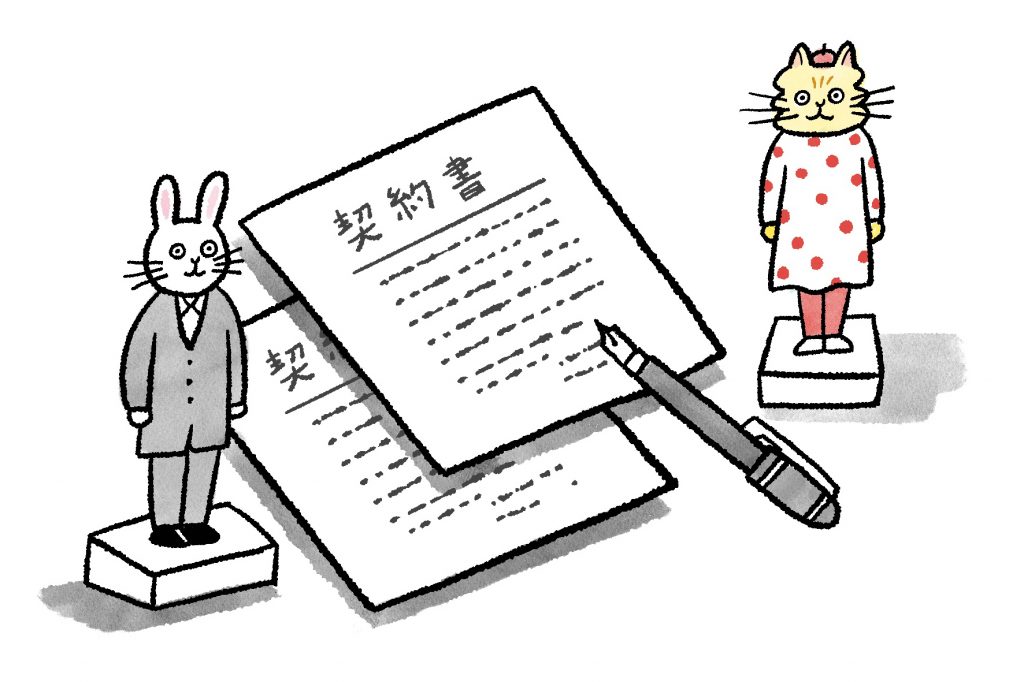
 Maruyama
Maruyama
Please make an effort to secure some form of commitment, regardless of its format. If obtaining a formal contract is challenging, obtaining confirmation via email could suffice. The crucial point is to obtain the other party’s explicit approval is essential.
 Kakuta
Kakuta
It’s a matter of precision. Once again, a written contract is the optional solution. Strive to make it as explicit and comprehensive as possible, so that even if a third party reviews it later, they can recognize it as a binding agreement. As the formality decreases, communication could transition to email or, in certain cases, platforms like LINE.
What’s the most concise and legally effective way to communicate the notion of “will you compensate me for any damage” to the other party? I’d be taken aback if I received a message on LINE stating “A shall compensate B” out of the blue.
 Tamako
Tamako
 Kakuta
Kakuta
Generally speaking, the wording shouldn’t violate public order or morals, but it should clearly convey that “the gallery will fully compensate you in any event,” leaving no room for misunderstanding.
Do I need to include terms like “any” or “fully”? I’m not accustomed to using such language, so I’m hesitant …
 Tamako
Tamako
 Maruyama
Maruyama
I have a suggestion. How about keeping a contract template with such language readily available? You can present it during meetings and say, “I request your signature on this document, as I do with any galleries. I apologize for any inconvenience,” and prompt them to confirm and even sign it on the spot.
In that case, I feel confident about proceeding!
 Tamako
Tamako
 Kakuta
Kakuta
Additionally, it’s advisable to bring two copies of the same content so that both parties can retain a copy.
 Maruyama
Maruyama
Another approach is to send the contract text via email with a message stating, “My legal advisor has requested a response to this,” and then ask them to reply to the email with a simple “Acknowledgement” after reviewing the content. It’s a straightforward method.
That’s lower the bar. I’d like to day, “My legal counsel is nagging me to get a response.” I’ll carefully consider whether to settle out of court for the damaged piece this time, but I’ll ensure I’m better prepared in the future. I feel much more at ease after talking to both of you.
 Tamako
Tamako
 Maruyama
Maruyama
If you can’t substantiate your case, the court won’t be able to validate it. Therefore, it’s wise to maintain some form of evidence and records on a daily basis.
 Kakuta
Kakuta
Consulting with a third party, particularly someone with legal expertise, is the surest way to ensure clarity. There are a various specialized institutions available, and Arts and Law, located where we are, is one of them. We encourage you to utilize their services.
Arts and Law
Arts and Law (AL) is a non-profit voluntary organization dedicated to planning and implementing support programs for artistic, cultural, and creative endeavors. These programs include a free consultation service, facilitated by qualified professionals such as lawyers, patent attorneys, and accountants.
https://www.arts-law.org (in Japanese)




